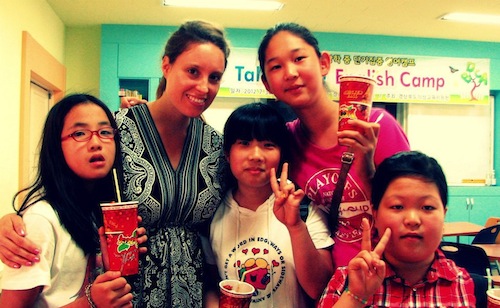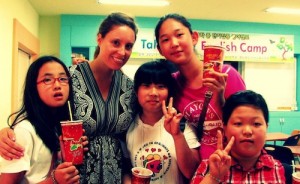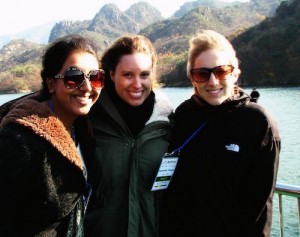Interview with Alana Delia, An American Teacher in Gumi, South Korea

Alana Delia has been teaching in South Korea for the past two and a half years through the EPIK program. An avid traveler, Alana has enjoyed adventures all over Asia. Read on to learn what she has to say about life as an English teacher in South Korea.

I am an English Teacher at a public middle school in South Korea in the city of Gumi. I’m from Connecticut, but Korea has certainly become my second home after living and teaching here for more than two and a half years. I really love Asian culture as well as Asian food (vegetarian). I really enjoy traveling and am always eager to learn from others.
For more information on my life in South Korea, check out my blog at www.alanainkorea.blogspot.com.
How have you enjoyed living in South Korea to date?
I’ve really enjoyed a great quality of life in South Korea since arriving in October of 2010. I have had countless opportunities to sightsee around the country, experience local culture as well as experience Korean festivals. Public transportation is accessible and cheap everywhere within Korea. I have been to many national parks and cities by bus. Buses and trains can literally get you anywhere in country within a day or less.
I am also very grateful for the kindness that my coworkers show me. They have invited me to their homes for meals as well as asking me to join them in their office for tea during break time.
What advice can you give to new teachers interested in teaching in South Korea?
Before moving to South Korea you must really do your research and know what you are looking for out of your experience. Do you want to live rurally or in a big city? When you are applying for a teaching position you should really know the difference between a rural and city placement (lifestyle).
Three years ago when I was in the process of applying, I had no idea where I wanted to live (or province) within Korea. It was overwhlming when deciding which province to apply to. After my orientation I got placed in a rural village with 2,000 locals and thankfully four foreigners. I know now that I was placed there for a reason and since then I’ve learned to enjoy countryside life and to be humble. I made the best out of my placement and traveled on the weekends all around Korea with friends before transferring to a city location after my contract was complete.
Also, come to Korea with an open mind. Here in Korea, everything is subject to change, especially at your workplace. At your school, last minute changes will come up, such as a last minute staff meals or all classes being cancelled for the day.
Keep an open mind and don’t get too frustrated by last minute arrangements. Know that this happens to all English Teachers!
Can you tell us about a particularly powerful moment in your classroom?
A powerful moment in my teaching experience took place at a rural elementary school. There were seventeen students in the entire school. One student, Hilda, really stood out to me because she was ever so shy and scared to talk with me when I came to her classroom. She would laugh insessantly and refuse to answer when I would ask her questions throughout the school year. The second semester she really warmed up to me and took an interest in me as a teacher. She tried her best to ask me questions in English or say random words that I taught her. During our last English lesson together we were practicing the phrase “I can”. Hilda eagerly shouted all these powerfully positive phrases smiling at me, “Alana, I can swim, I can read, I can write…” and so on. It really touched me to watch a student grow and willing to learn. I will never forget that moment. Hilda made me a beautiful card that she wrote me in English. In that moment I had to walk out of the classroom becaus I had tears in my eyes. Hilda truly persevered in that school year and I will never forget about my experience teaching her.
What are the positive and negative aspects of living in South Korea?
Let’s begin with the positive! Know that the teaching community in South Korea is very strong. In my experience the foreign community is very tight knit and people really support each other, whether it is sharing or giving advice. Know that whatever you go through – whether it’s related to teaching, your coteachers, or housing arrangements – everything is always subject to change and can improve. In difficult moments know that you have a community of people to support and give you some guidance. I have found that life in Korea is full of surprises. There are always opportunities to try new hobbies, make new friends, travel to different parts of the country, and grow as a person. Eating out can be very inexpensive and a great way to get friends together on the weekends and explore new restaurants.
Being a vegetarian it is really difficult for me to enjoy staff meals when everyone around me is eating meat. I find the Korean dining options at times very limiting especially while traveling. Koreans love meat and I don’t! Being an average size 6/8 in clothes I still cannot find clothes that fit me! It’s funny to me that we can’t try on the clothes before we buy them at most stores! I’ve had my family send me clothes or I order online and have it shipped it me.
Have you had the opportunity to travel much in Asia?
I caught the travel bug after studying abroad in South Africa followed by a 24 day overlanding safari through seven African countries. I have taken all opportunities to travel during my vacation time (winter and summer break) in Korea. I’ve been able to travel to Bali and Thailand, and I took cooking classes, yoga, and cycling courses in both countries. I volunteered two summers in a row teaching English and swimming class to students in Taipei.
For the Korean Chuseok holiday (Korean Thanksgiving) I hopped on a ferry with friends to cycle the Japanese Island of Tushima for a few days. Most recently for this winter holiday, I was able to visit family in the U.S., explore amazing food in Singapore, and lastly take a tram to Victoria Peak in Hong Kong experiencing the best views the island of Hong Kong has to offer.
You have eighteen vacation days in your first year of your EPIK contract. Take full advantage of your vacation time if you really enjoy traveling!
Do you have any favorite blogs or websites about South Korea that you’d like to share with our readers?
For help with lesson planning and finding fun activities that your students will love I recommend www.waygook.org. This website will give you the complete lowdown on life in South Korea, not only covering teaching but also life here. There are forums on travel, restaurants, visas, and teaching in other countries. Remember to not take your lessons too seriously. Keep them fun and interesting as much as possible. There will be days when the students will misbehave and be too roudy especially before exams. I use this website a lot to find creative materials outside of the textbook I have to teach.
www.eatyourkimchi.com has awesome videos on life in Korea. Simon and Martina (the hosts) tell you all about Korean food, culture, teaching, and everything else. I love this site and it’s very useful.
Is there anything else you’d like our readers to know about?
Life in South Korea is what you make of it. If you come with an open mind willing to learn from others and learn what Korean culture is all about, you will have an experience more than you could have imagined possible.
When moving to a new country there will will always be ups and downs. Culture shock can feel isolating and every person will experience it differently.
Know that you are never truly alone. Make contacts from your orientation and get together on weekends if you aren’t in the same city (location). Before coming to Korea I had never had a Korean meal, I’d never eaten with chopsticks, I didn’t know any phrases or words in Korean, nor did I know anything about Korean culture. I tried to prepare myself by reading through Lonely Planets and forums online, but once I came here everything fell into place.
I now have a greater appreciation for this culture and wouldn’t trade this opportunity for anything else in the world. Of course there will be moments in the classroom or cultural differences with Korean coworkers or friends, but take each day at a time.
Remember to always keep your English classes fun and don’t take it too seriously at times. Best of luck to you!




